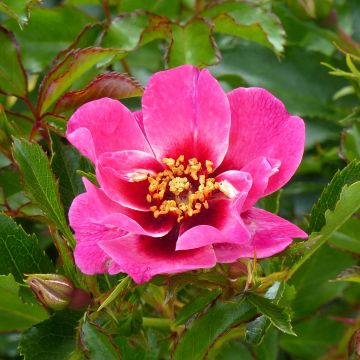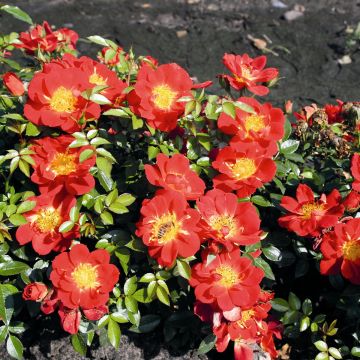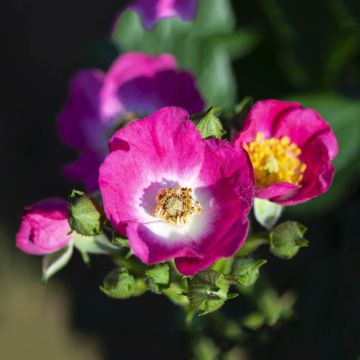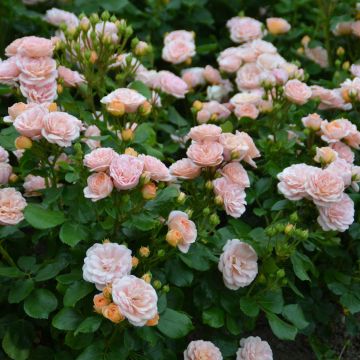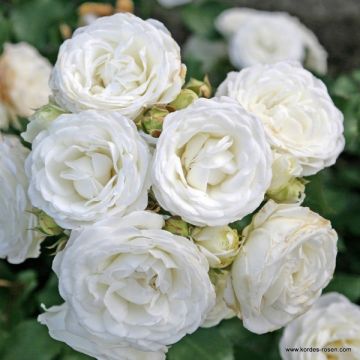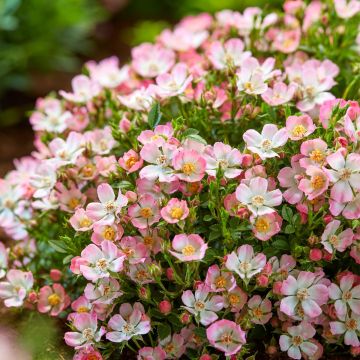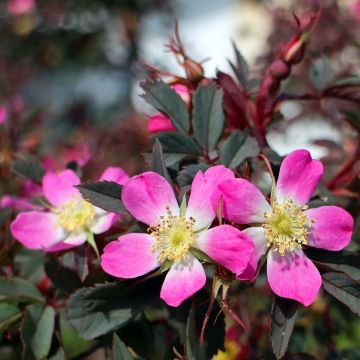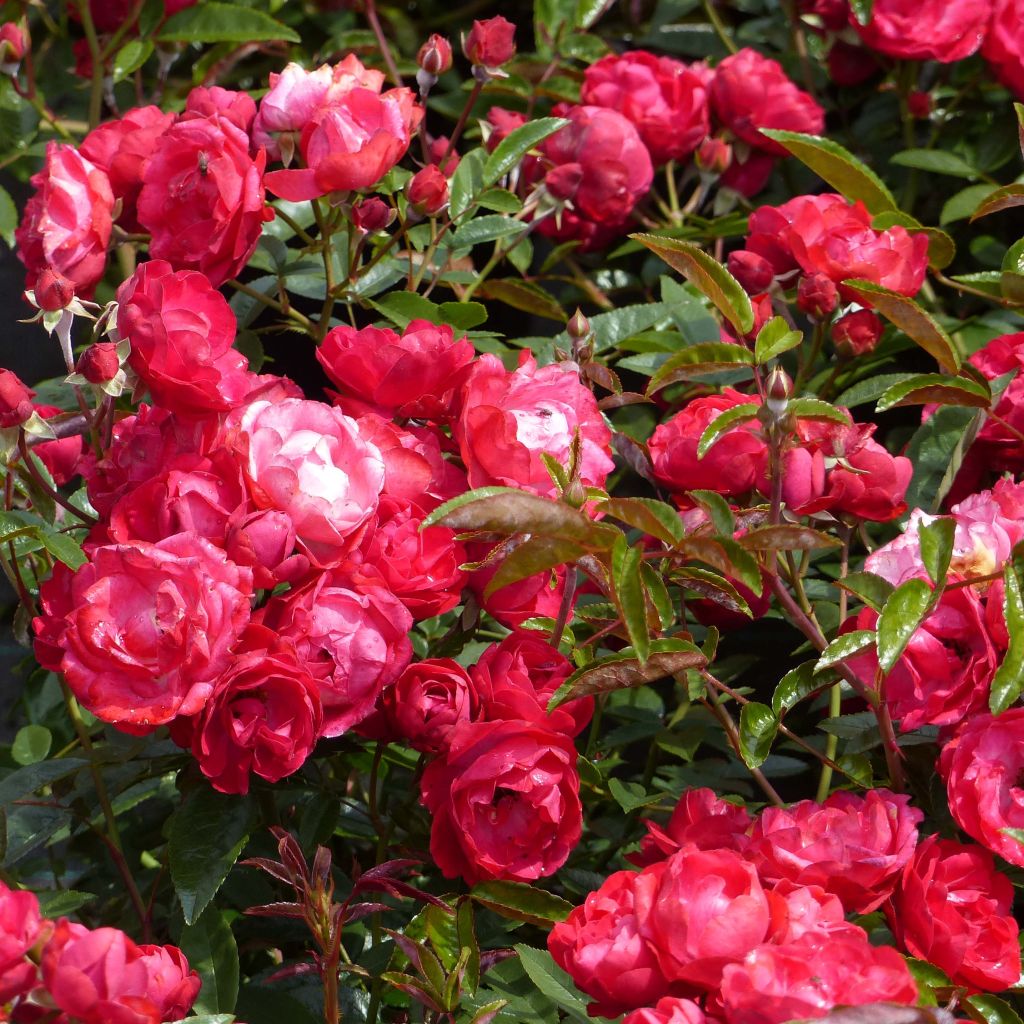

Rosa x polyantha KOSTER 'Fête des Mères' - Miniature Rose
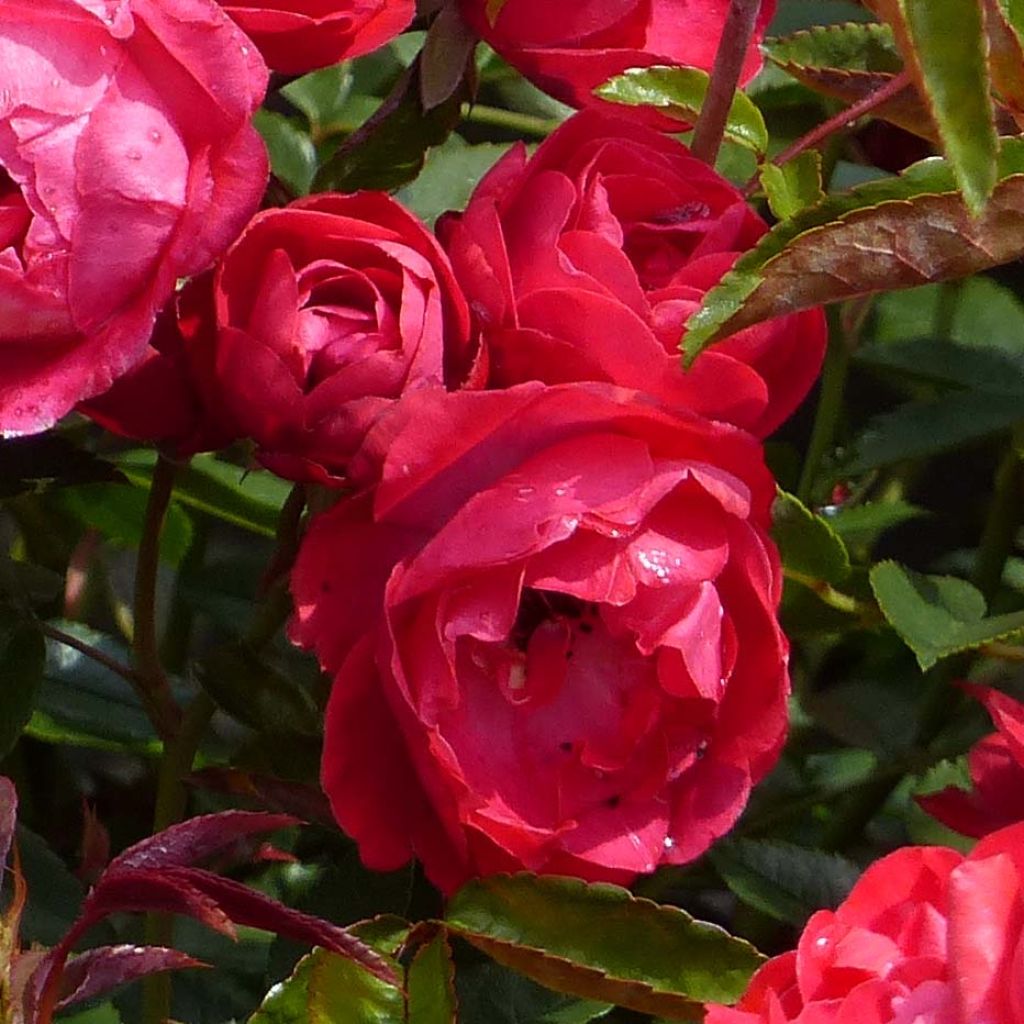

Rosa x polyantha KOSTER 'Fête des Mères' - Miniature Rose
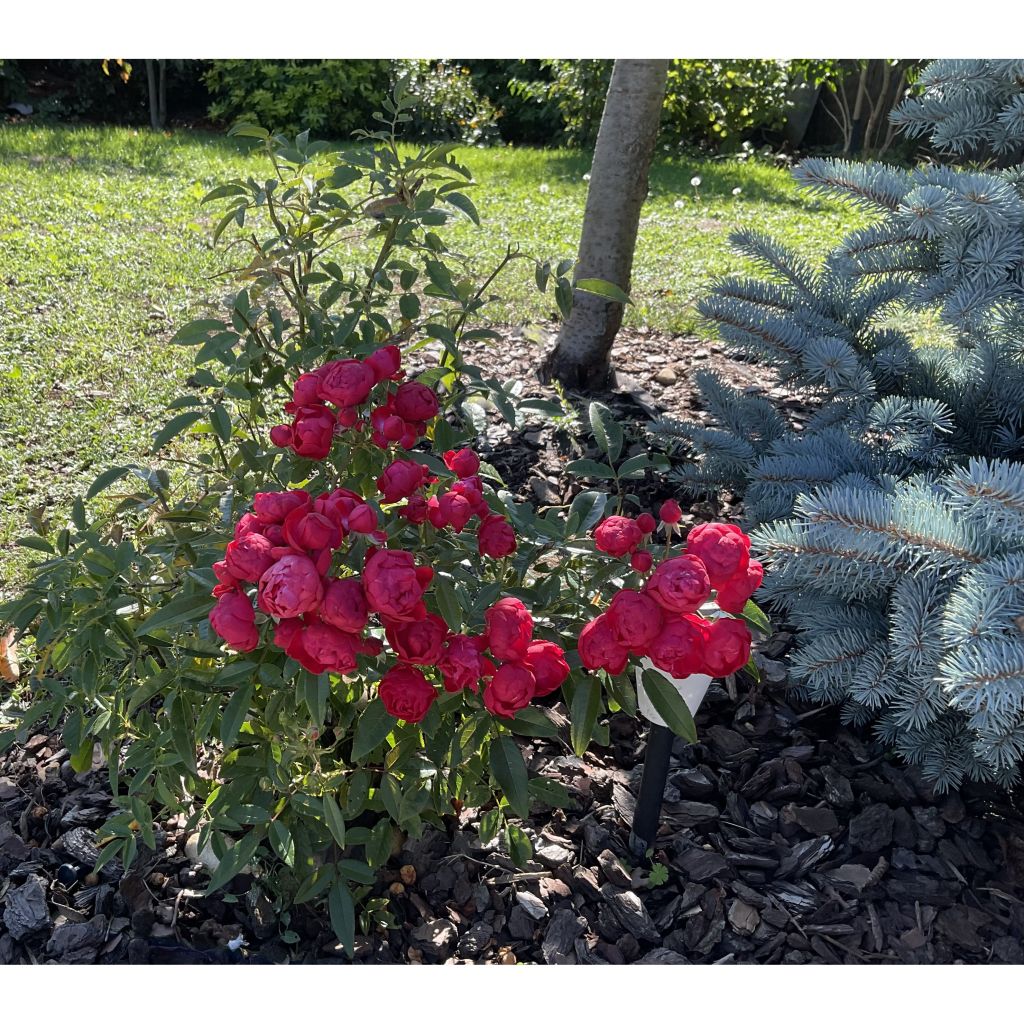

Rosa x polyantha KOSTER 'Fête des Mères' - Miniature Rose
Rosa x polyantha KOSTER 'Fête des Mères' - Miniature Rose
Rosa x polyantha KOSTER Fête des Mères (Rood Moorsdag)
Rood Morsdag Polyantha Rose
This item cannot be shipped to the selected country
Delivery charge from €5.90
Delivery charge from €5.90
Delivery to Corse prohibited
More information
Schedule delivery date,
and select date in basket
This plant carries a 24 months recovery warranty
More information
We guarantee the quality of our plants for a full growing cycle, and will replace at our expense any plant that fails to recover under normal climatic and planting conditions.
From €5.90 for pickup delivery and €6.90 for home delivery
Express home delivery from €8.90.
From €5.90 for pickup delivery and €6.90 for home delivery
Express home delivery from €8.90.
Delivery to Corse prohibited: UE law prohibits the import of this plant from mainland France to Corse as part of the fight against Xylella fastidiosa. Please accept our sincere apologies.
More information

Does this plant fit my garden?
Set up your Plantfit profile →
Description
The 'Mother's Day' Rose Bush is the striking leader of a series of somewhat unusual polyantha mini-roses bearing koster-type roses, which are not commonly used in French gardens. It is a very small bush, transforming from May to June until the frost into a living bouquet composed of many small double flowers that are almost spherical and intensely cherry-red. It can be placed anywhere in the garden, to fill a gap in a flowerbed, in a pot on the terrace, in a flower box, or used to create beautiful colourful borders that will touch not only the hearts of mothers!
The Mother's Day Rose Bush, officially named 'Morsdag', was discovered in 1949 in the Netherlands by FJ Grootendorst, who is famous for his rough rose varieties with carnation-like flowers. This Mother's Day variety is a seedling of Dick Koster. Despite its age, it continues to be distinguished in relatively recent competitions.
It is a rose bush with clustered flowers and a remarkably compact, perpetual habit with thin but strong stems. If left unrestricted, 'Mother's Day' will not exceed 30-40cm (12-16in) in height, with a little more width. It can also be trained on a trellis in a pot to decorate the terrace, forming a mini-climber that reaches a height of 50-60cm (20-24in). The flowering lasts for about five months. On the new shoots, clusters of tiny pointed buds appear, which open into 3-4 cm (1-2in) flowers composed of 26 to 40 very concave petals, giving the impression that this little rose refuses to bloom fully. The flowers have a light fragrance. They are placed on abundant, shiny foliage, which shows little sensitivity to diseases under good growing conditions. Cuttings and layering can quickly propagate this variety.
This rose bush, known as a "dwarf" or "patio" rose, performs very well both in the ground and in deep pots and flower boxes. It is perfect for filling a low border and flowering on a terrace. Pair your Mother's Day Rose Bush with other terrace plants such as lobelias, nemesias, diascias, or bidens. Its flowers, which resemble miniature peonies, go well in the ground with the fluffy spikes of catmints, the small blue cups of perennial geraniums, and other miniature roses such as Blue Boy or Pomponella.
Report an error about the product description
Rosa x polyantha KOSTER 'Fête des Mères' - Miniature Rose in pictures
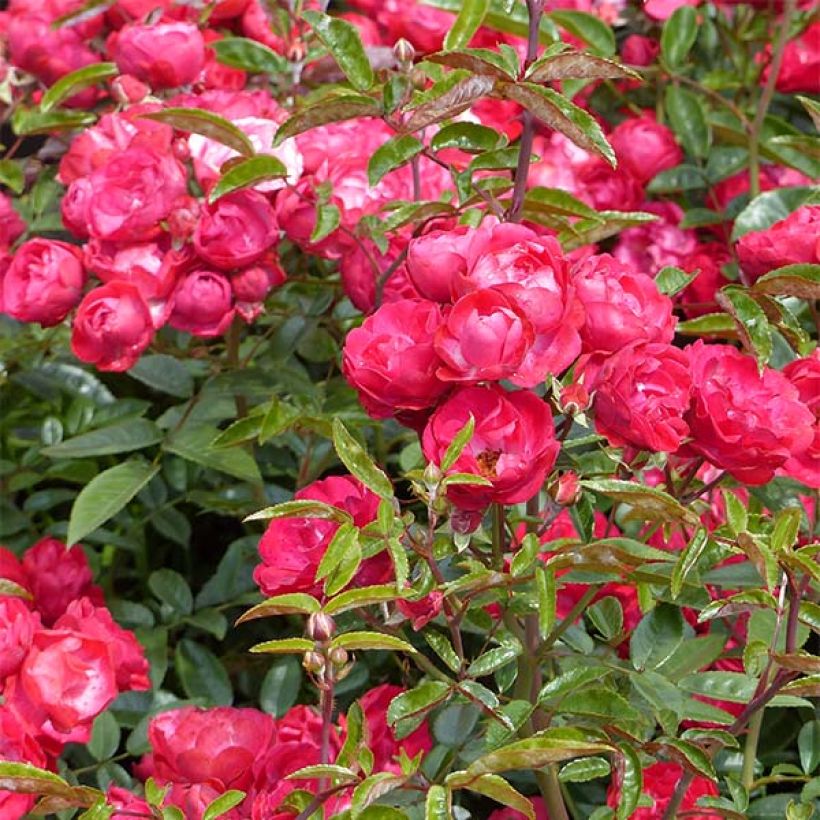

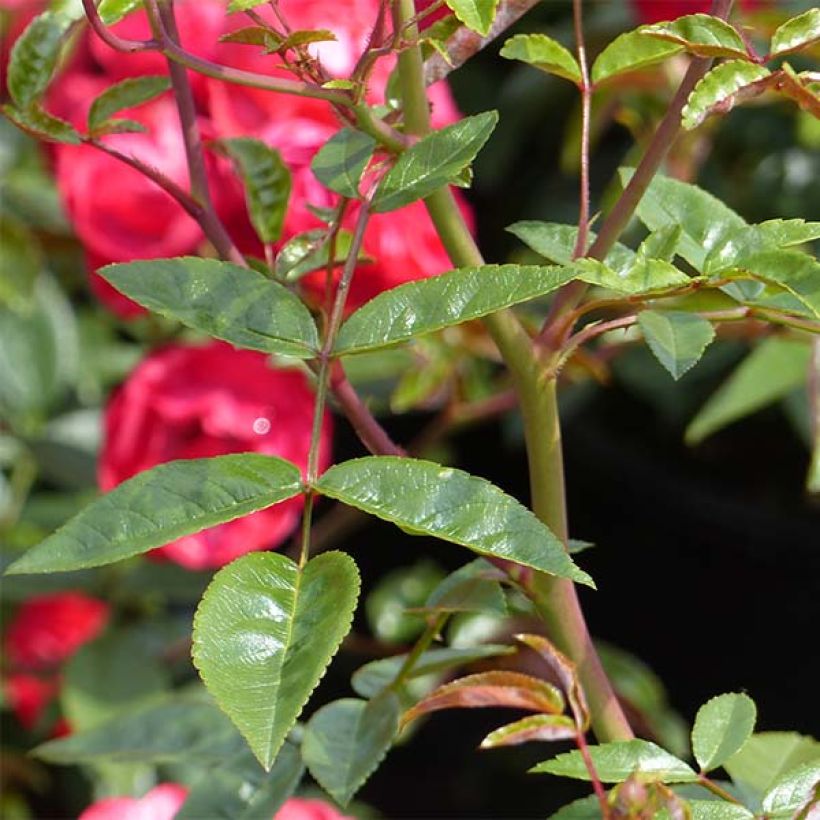

Plant habit
Flowering
Foliage
Botanical data
Rosa
x polyantha
KOSTER Fête des Mères (Rood Moorsdag)
Rosaceae
Rood Morsdag Polyantha Rose
Cultivar or hybrid
Rosa canina Laxa (3L/4L pot, Wrapped bare root)
Other Dwarf and mini Roses
Planting and care
The 'Mother's Day' Dwarf rose prefers sunny locations. Excessive limestone can cause chlorosis. This rose is highly resistant to disease, but if you notice any spotted or affected leaves, remove them immediately. This rose is perfectly hardy in the open ground but will be more fragile in pots, so protect it from the rigours of winter. To plant your rosebush, work the soil by crumbling it well and placing an amendment such as blood, fish and bone at the bottom of the planting hole. Water copiously after planting to remove air pockets. Water regularly for a few weeks to help the plant take root. Use a mixture of garden soil and potting compost in a ratio of 1/3 to 2/3. Don't forget a layer of clay balls or gravel for drainage. In these conditions, make sure it is watered throughout the year. Remove spent flowers regularly during the summer to stimulate the development of younger buds. Pruning involves removing these flowers and reshaping the bush.
Roses may develop unsightly spots at the end of summer, but this is a natural occurrence and doesn't harm the rose's growth.
Planting period
Intended location
Care
-
, onOrder confirmed
Reply from on Promesse de fleurs
Roses by purpose
Haven't found what you were looking for?
Hardiness is the lowest winter temperature a plant can endure without suffering serious damage or even dying. However, hardiness is affected by location (a sheltered area, such as a patio), protection (winter cover) and soil type (hardiness is improved by well-drained soil).

Photo Sharing Terms & Conditions
In order to encourage gardeners to interact and share their experiences, Promesse de fleurs offers various media enabling content to be uploaded onto its Site - in particular via the ‘Photo sharing’ module.
The User agrees to refrain from:
- Posting any content that is illegal, prejudicial, insulting, racist, inciteful to hatred, revisionist, contrary to public decency, that infringes on privacy or on the privacy rights of third parties, in particular the publicity rights of persons and goods, intellectual property rights, or the right to privacy.
- Submitting content on behalf of a third party;
- Impersonate the identity of a third party and/or publish any personal information about a third party;
In general, the User undertakes to refrain from any unethical behaviour.
All Content (in particular text, comments, files, images, photos, videos, creative works, etc.), which may be subject to property or intellectual property rights, image or other private rights, shall remain the property of the User, subject to the limited rights granted by the terms of the licence granted by Promesse de fleurs as stated below. Users are at liberty to publish or not to publish such Content on the Site, notably via the ‘Photo Sharing’ facility, and accept that this Content shall be made public and freely accessible, notably on the Internet.
Users further acknowledge, undertake to have ,and guarantee that they hold all necessary rights and permissions to publish such material on the Site, in particular with regard to the legislation in force pertaining to any privacy, property, intellectual property, image, or contractual rights, or rights of any other nature. By publishing such Content on the Site, Users acknowledge accepting full liability as publishers of the Content within the meaning of the law, and grant Promesse de fleurs, free of charge, an inclusive, worldwide licence for the said Content for the entire duration of its publication, including all reproduction, representation, up/downloading, displaying, performing, transmission, and storage rights.
Users also grant permission for their name to be linked to the Content and accept that this link may not always be made available.
By engaging in posting material, Users consent to their Content becoming automatically accessible on the Internet, in particular on other sites and/or blogs and/or web pages of the Promesse de fleurs site, including in particular social pages and the Promesse de fleurs catalogue.
Users may secure the removal of entrusted content free of charge by issuing a simple request via our contact form.
The flowering period indicated on our website applies to countries and regions located in USDA zone 8 (France, the United Kingdom, Ireland, the Netherlands, etc.)
It will vary according to where you live:
- In zones 9 to 10 (Italy, Spain, Greece, etc.), flowering will occur about 2 to 4 weeks earlier.
- In zones 6 to 7 (Germany, Poland, Slovenia, and lower mountainous regions), flowering will be delayed by 2 to 3 weeks.
- In zone 5 (Central Europe, Scandinavia), blooming will be delayed by 3 to 5 weeks.
In temperate climates, pruning of spring-flowering shrubs (forsythia, spireas, etc.) should be done just after flowering.
Pruning of summer-flowering shrubs (Indian Lilac, Perovskia, etc.) can be done in winter or spring.
In cold regions as well as with frost-sensitive plants, avoid pruning too early when severe frosts may still occur.
The planting period indicated on our website applies to countries and regions located in USDA zone 8 (France, United Kingdom, Ireland, Netherlands).
It will vary according to where you live:
- In Mediterranean zones (Marseille, Madrid, Milan, etc.), autumn and winter are the best planting periods.
- In continental zones (Strasbourg, Munich, Vienna, etc.), delay planting by 2 to 3 weeks in spring and bring it forward by 2 to 4 weeks in autumn.
- In mountainous regions (the Alps, Pyrenees, Carpathians, etc.), it is best to plant in late spring (May-June) or late summer (August-September).
The harvesting period indicated on our website applies to countries and regions in USDA zone 8 (France, England, Ireland, the Netherlands).
In colder areas (Scandinavia, Poland, Austria...) fruit and vegetable harvests are likely to be delayed by 3-4 weeks.
In warmer areas (Italy, Spain, Greece, etc.), harvesting will probably take place earlier, depending on weather conditions.
The sowing periods indicated on our website apply to countries and regions within USDA Zone 8 (France, UK, Ireland, Netherlands).
In colder areas (Scandinavia, Poland, Austria...), delay any outdoor sowing by 3-4 weeks, or sow under glass.
In warmer climes (Italy, Spain, Greece, etc.), bring outdoor sowing forward by a few weeks.

































